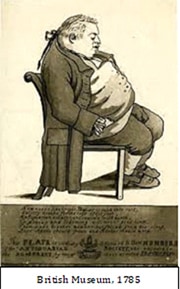Sleep Apnea AND MORE TROUBLE?
Depression, High Blood Pressure, Obesity and Liver Disease
Pictured here is Francis Grose (1731-1791). He was an English antique collector/dealer and gifted storyteller. His friend, Rev James Douglas, drew this portrait depicting Grose as a thick-necked man asleep with his mouth partially open. If you close your eyes, you can almost hear his snoring thundering through a meeting he was attending with fellow antique dealers. He was known as a great drinker, eater and of course, he loved his sleep. He ultimately died suddenly of an assumed stroke at the age of 60 (one of the big 3 mentioned in the previous chapter).
This sketch is thought to be the first illustration of obstructive sleep apnea syndrome. While Grose never had the chance to have a home, or lab sleep test done, it is not a far leap to assume he had some form of obstructive sleep apnea. Taking it a step further, we could also guess that Grose also suffered from high blood pressure and as the picture depicts, he was obese as well. In fact, Grose was thought to be 5 feet tall and 22 stone or 308 lbs. At this weight and height his body mass index, or BMI, would have been 60 (between 18.5 and 24.9 is considered healthy). Grose possesses some common risk factors for sleep apnea as discussed earlier.

Some other illnesses associated with sleep apnea outside of the Big 3 are depression, high blood pressure, obesity (see Grose above) and liver disease. All these conditions are due to the body’s inability to regulate itself correctly.
Sleep apnea, as described in other chapters, deprives the body of oxygen. The lack of oxygen stresses your body out. .Have you ever been swimming in the ocean and unexpectedly been pushed down to the bottom by a wave? When you finally make it to the surface, your heart is beating 90 miles an hour, you can’t catch your breath and you’re shaking. Your fight or flight system that we talked about in the last chapter has kicked in. Sleep apnea causes that same response because your body cannot breathe. Only it’s at night, in the comfort of your own bed and not in the ocean. You are fighting to stay alive.

NO OXYGEN -> YOU DIE
And, your brain wants to keep you alive. So, you wake up, disrupting your sleep and all the important stuff that happens while you sleep.
High blood pressure is known as the silent killer because you have no obvious symptoms until it has done significant damage to your body. Increased blood pressure can cause a heart attack or like in our friend Grose’s case a fatal stroke (one of the BIG 3, mentioned in the previous chapter).
The activation of fight or flight is responsible for increasing your blood pressure. Your body is pumping blood faster because it senses danger. Only in the case of obstructive sleep apnea, it’s not lack of oxygen because of ocean waves on top of you.
Stress Response
The stress hormone cortisol also increases in the fight or flight response. Struggling to breathe every night encourages your body to store fat. See Francis Grose as exhibit 1 of this phenomenon.

Other metabolic conditions such as Nonalcoholic Fatty Liver Disease (NAFLD) and insulin resistance are affected by your flight or flight response. Over 20 studies have linked Obstructive Sleep Apnea and Nonalcoholic Fatty Liver Disease due to the low nighttime oxygen levels. The liver can try to repair itself from this condition, causing scarring and reducing its ability to function.
Pinpointing the exact link between sleep apnea and depression has proved complex for researchers. It has been found to involve the relationship of serotonin that is both involved in depression and the upper airway. Although we don’t need to worry about the exact relationship of what receptors or other scientific jargon are involved, we do need to understand that sleep issues increase the likelihood of depression.
As many as 46% of adults with confirmed obstructive sleep apnea also report symptoms of depression. Lack of sleep is associated with the inability to regulate our mood. We have all heard the phrase “waking up on the wrong side of the bed.” Sometimes we say this in good fun to our family members or bed partners, but lack of good quality sleep can do real damage to our thoughts and our ability to deal with our emotions. E. Joseph Cossman captured the relationship of sleep and emotion with this quote, “The best bridge between despair and hope is a good night’s sleep.”
Depression, high blood pressure, obesity and liver disease are all linked with obstructive sleep apnea. Some sleep sufferers will develop one of these illnesses while others will develop one or two on top of the Big 3. Increasing good quality sleep will not magically cure these illnesses but it will give your body the necessary rest to begin repairing itself.
Save the “fight or flight” response for the ocean and not for your bed.


Comments are closed.